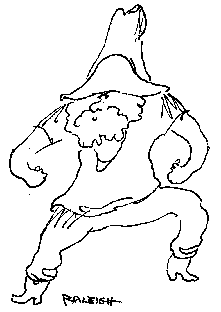|
We'll
Still Love You, Ed Wood
By HENRY P. RALEIGH
ART TIMES October 2008
YOU
CAN’T FIND them anymore. They used to be plentiful. And I, for one,
miss them. I mean the stock character actors that peopled the B
films of the 30’s and on into the 50’s before changes in the studio
system and the abandoning of the B film product by the 60’s left
no room for such specialty actors. They were never replaced and
age did the rest. You can still catch them on cable film channel
re-runs of old films.
A character actor is generally defined as an actor who, by virtue of
certain physical and personal acting distinctions, is never cast
in leading roles. Some, like Walter Brennan, who played toothless
old men while yet in his thirties, was inevitably cast as the sidekick
to a male lead as was the plump Irishman Frank McHugh of the high-pitched
voice and perpetual look of surprise. Others were typecast as either
cops or gangsters, brutish Barton MacLane and Edward Pawley among
these.
Possessing well-defined and absolutely unvarying personae, there was
a stock character for every condition and foible you could imagine,
and most often a comedic exaggeration of each: cool, wise-cracking
girl friend (Eve Arden); maid, cook, housekeeper (Thelma Ritter);
lovable old duffer of foreign background speaking garbled English
(S.Z. Sakall clasping hands to cheeks in exasperation and uttering
his signature ‘Woooosh’); crusty old duffer speaking precise academic
English, can keep a monocle in eye (Charles Coburn); dithering old
duffer, confused and henpecked (Charles Ruggles).
Does
your script call for a sinister housekeeper? Gale Sondergaard with
the smile that can chill your heart will do nicely. Or a gangster
of an equally terrifying smirk? Eduardo Cianelli fits the bill. How
about a sniveling, cowardly nerd? Well, you can’t beat Elisha Cook
Jr. A funny Russian, try Mischa Auer, bug-eyed, arms flapping. A comic
tough who spoke New Yorkese out of the corner of his mouth —
that’s Allen Jenkins. There was barely a 30’s film from Warners that
didn’t have Jenkins in it. A dumb cop? Lots of these like Nat Pendleton
(big) or Ed Brophy (fat). The Westerns had their own character specialties
— Gabby Hayes, Andy Devine, Smiley Burnette.
One
of the oldest, as well as one of the longest running character actors
was William Demarest. After performing in vaudeville, his first film
was in 1927. He ended his career in the 1970-71 TV series “My Three
Sons”, still playing a scowling curmudgeon. Perhaps the very last
of the character types was Jack Elam. Elam began in Westerns in 1950
where he was a familiar figure and could be seen often in detective
and sci-fi films. He was an audience favorite for decades. Fans of
Elam expressed disappointment when he was killed off early in “Once
Upon a Time in the West”, trying to brush a fly off his nose. One
of his best was with James Garner in “Support Your Local Sheriff”.
“Shadow Force” and “The Uninvited” in 1993 were his last films.
It
would be hard to locate any contemporary actors that serve the function
of the old breed of character actors. Harry Dean Stanton comes to
mind, maybe John C. Riley or Steve Buscemi. Yet, while certainly having
unique film personae, they are far more ordinary in the types of roles
they play and none have unusual idiosyncrasies — nor can they,
most likely, if they are to be employed. Harry Dean Stanton is two
different men in “Repo Man” and “The Man Who Cried”, two entirely
different films. This is true also of Steve Buscemi in “Fargo” and
“Trees Lounge”. Lead actors now willingly move into what was once
the exclusive territory of the old character actor, sometimes with
unfortunate results — witness Gwyneth Paltrow in “Shallow Hal”.
Today’s
films have little need of the stock character actor. Gone are the
days when studios like Warners and MGM had a brand image and a stable
of contract actors to match. They could re-cycle their leads and character
actors over all their productions with scripts developed just for
them. There is a loss of intimacy in the absence of the character
actor; the leads in a film were always above you in beauty, courage
and heroics, but the character actor was sort of at your own level
of existence, an amusing bumbler. Maybe that’s why I miss them.
|

